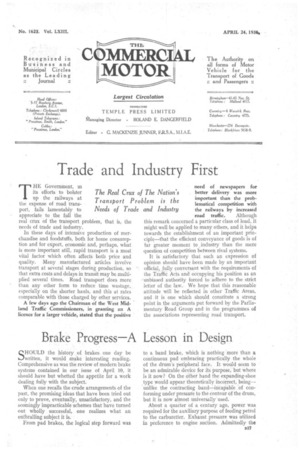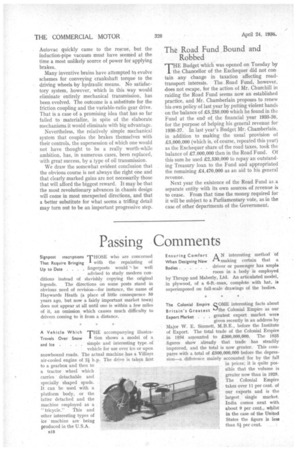Brake Progress —A Lesson in Design
Page 31

Page 32

If you've noticed an error in this article please click here to report it so we can fix it.
SHOULD the history of brakes one day be written, it would make interesting reading. Comprehensive as was the review of modern brake systems contained in our issue of April 10, it should have but whetted the appetite for a work dealing fully with the subject.
When one recalls the crude arrangements of the past, the promising ideas that have been tried out only to prove, eventually, unsatisfactory, and the seemingly impracticable schemes that have turned out wholly . successful, one realizes what an enthralling subject it is: From pad brakes, the logical step forward was to a band brake, which is nothing more than a continuous pad embracing practically the whole of the drum's peripheral face. It would seem to be an admirable device for its purpose, but Where is it now? On the other hand the expanding-shoe ,type would appear theoretically incorrect, being—. unlike the contracting baud—incapable of conforming under pressure to the contour of the drum, but it is now almost universally'used.
About a quarter of a century ago, power was required for the auxiliary purpose of feeding petrol to the carburetter. Exhaust pressure was utilized in preference to engine suction. Admittedly the Autovac quickly came to the rescue, but the induction-pipe vacuum must have seemed at the time a most unlikely source of power for applying brakes.
Many inventive brains have attempted to evolve schemes for conveying crankshaft torque to the driving wheels by hydraulic means. No satisfactory system, however, which in this way would eliminate entirely mechanical transmission, has been evolved. The outcome is a substitute for the friction coupling and the variable-ratio gear drive. That is a case of a promising idea that has so far failed to materialize, in spite of the elaborate mechanisms it would eliminate with big advantage.
Nevertheless, the relatively simple mechanical system that couples the brakes themselves with their controls, the supersession of which one would not have thought to be a really worth-while ambition, has, in numerous cases, been replaced, with great success, by a type of oil transmission.
We draw the somewhat evident conclusion that the obvious course is not always the right one and that clearly marked gains are not necessarily those that will afford the biggest reward. It may be that the most revolutionary advances in chassis design will come in most unexpected directions, and that a better substitute for what seems a trifling detail may turn out to be an important progressive step.
The Road Fund Bound and Robbed
E Budget which was opened on Tuesday by the Chancellor of the Exchequer did not con. tam any change in taxation affecting roadtransport interests. The Road Fund, however, does not escape, for the action of Mr. Churchill in raiding the Road Fund seems now an established practice, and Mr. Chamberlain proposes to renew his own policy of last year by putting violent hands on the balance of £5,250,000 which he found in the Fund at the end of the financial year 1935-36, for the purpose of helping his general revenue for 1936-37. In last year's Budget Mr. Chamberlain, in addition to making the usual provision of £5,000,000 (which is, of course, repeated this year) as the Exchequer share of the road taxes, took the balance of £7,000,000 then in the Road Fund. Of this sum he used £2,530,000 to repay an outstanding Treasury loan to the Fund and appropriated the remaining £4,470,000 as an aid to his general revenue.
Next year the existence of the Road Fund as.a separate entity with its own sources of revenue is to cease. From that time the money required for it will be subject to a Parliamentary vote, as in the case of other departments of the Government.




























































































